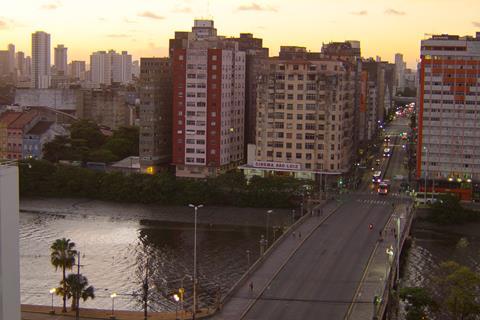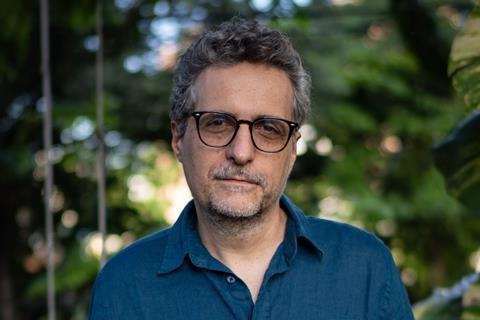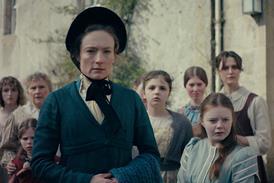
With his latest documentary Pictures Of Ghosts, Brazilian filmmaker Kleber Mendonça Filho delivers his most intimate film to date. A diary-style look at cinemagoing culture in his hometown of Recife, in the northeast of Brazil, Filho journeys through his own memories, utilising archival photographs and footage from his youth.
The first stop is the apartment where Filho lived for close to 40 years and shot several of his early no-budget movies, made with the help of friends and neighbours. From there the filmmaker explores the city, as seen through the prism of cinema. Through archive images he recalls the old movie theatres — some now disappeared, some transformed into evangelical churches — which witnessed the changes in society and the gradual decline of Recife’s once-vibrant city centre.
“The film does not present the themes that the international market expects from Brazilian films, but it is a continuation of my authorial work,” says Filho, whose debut 2008 documentary Critico saw critics and filmmakers discuss the conflict between art practice and critical analysis. Subsequent features Neighboring Sounds (2012) and Aquarius (2016) took a social-realist approach to their stories about the urban transformation of Recife, while 2019’s Bacurau — co-directed with Juliano Dornelles — took a more allegorical, genre-infused approach to issues of community erosion.
Pictures Of Ghosts, which is produced by Brazil’s CinemaScopio and Vitrine Filmes with sales by Urban Sales, continues Filho’s exploration of the changing face of his hometown and, in the absence of traditional talking head interviews, he himself provides a narration that ties together its procession of old and new images. “People are generally surprised by this personal tone because today everything is automated,” he says. “Films seem to have been made using an app. This is the criticism I make of the cultural industry as a whole.”
Greater understanding

Filho says he felt empowered to make a more intimate film at this juncture of his career because there is now a greater understanding of his work.
“Thanks to the films I made over the last 10 years, I don’t need to say who I am anymore,” he notes. Both Aquarius and Bacurau played in Competition at Cannes, with the latter sharing the jury prize with Ladj Ly’s Les Misérables, going on to pick up numerous other festival and awards body accolades. For the same reason Filho does not believe the Oscar campaign for Pictures Of Ghosts, which likewise premiered in Cannes this year, needs any specific angle. “I just need to show the film to as many voters as possible.”
Having Pictures Of Ghosts screen in, for example, Los Angeles’ Academy Museum of Motion Pictures as the opening film of this month’s Hollywood Brazilian Film Festival is, the filmmaker laughs, “very different to 2014”, when he struggled to get visibility for his fiction feature debut Neighboring Sounds, which was also Brazil’s Oscar submission. “The cinemas they booked for us back then were small screens in a large multiplex. It was clear we were left out of the loop.”
Much has indeed changed since then, even if the film marks a return to Filho’s documentary roots. Yet the director sees his new film as a continuation of his scripted work, which has been celebrated for capturing the soul and spirit of Recife. “I had this idea for many years,” he says. “The idea of the everyday experience being part of a film, and film transforming normal life into cinema, is very interesting to me.”
Up next for Filho is O Agente Secreto, a thriller set in 1977 during Brazil’s military dictatorship, with actor Wagner Moura (whose credits include Elite Squad, Wasp Network and Sergio). “The story benefits from a historical point of view, although no-one uses the word dictatorship here — it is just a presence,” Filho explains of the feature, to be shot next year. “It’s a film about the logic of my country.”
Filho believes Brazilian cinema is becoming stronger during the administration of president Luiz Inacio Lula da Silva, who has been in power since January. “We are reconnecting the cables that were cut, which takes time. But we are already resuming public policies that were sabotaged during the Michel Temer [2016-18] and Jair Bolsonaro [2019‑22] governments. The Audiovisual Sector Fund is back,” Filho notes, referring to the federal fund created in 2008 during Lula’s previous presidency from 2003-10, and frozen under Bolsonaro’s government.
There is a sense Filho’s career may have benefitted from Brazilian politics of recent years, particularly the rise of the right as spearheaded by Temer and Bolsonaro. Aquarius, for example, became a symbol of the artistic world’s resistance, and the film’s team protested on the Cannes red carpet in 2016 against the impeachment of former president Dilma Rousseff, which brought Temer to power.
Filho, however, is more circumspect. “As we lost a lot as a nation at that time, I would never be able to see anything positive in what happened, which goes for the idea I could have been propelled forward in my career because of that,” he asserts. “We even lost the notion of citizenship.”
Indeed, Filho suffered a backlash for his criticism of the Brazilian authorities. When it came to choosing Brazil’s 2016 Oscar entry, the Ministry of Culture appointed to the selection committee several professionals who had publicly positioned themselves against Filho. Aquarius was overlooked, and the committee instead chose David Schurmann’s Little Secret.
In 2019, under Bolsonaro’s regime, Filho received more bad news. He was asked to return part of the funding of Neighboring Sounds on the grounds that the final budget was higher than what had been approved. The filmmaker appealed the decision, arguing the increase was greenlit by ANCINE, Brazil’s national film agency; the case is ongoing. “We were persecuted during the Temer government and the disrespect for the artistic community continued during the Bolsonaro administration,” he says.
Yet, despite all the challenges, Filho is proud to have the opportunity to represent Brazil on the international stage. “I have found myself in situations where I was functioning as if I were a diplomat, [which] gave me the chance to talk about what was happening in my country,” he says. “When I went to Australia or France, I was always very well received, often even more than the official representative of the country who was also there. Ambassadors and diplomats were treated with less deference than me, an artist, which was ironic.”

























No comments yet